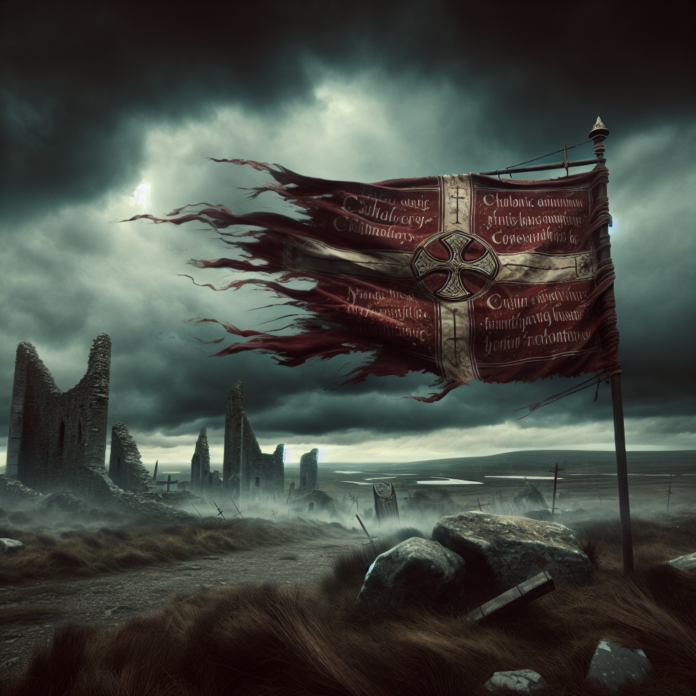Banner of Blood: Catholic Persecution of Protestants in 16th Century Ireland
The 16th century in Ireland was a period awash with blood, betrayal, and zealous crusades fueled by religious intolerance. This era offers a stark illustration of the perils posed when orthodoxies resist progressive reform, as evidenced by the Catholic persecution of Protestants. Through this dark chapter, we see that the clinging to traditional pursuits of power and control often comes at the expense of human dignity and societal progress.
The seeds of religious strife in 16th-century Ireland were sown deep within the core of medieval Catholic tradition, which held a stranglehold over the populace, dictating not just spiritual beliefs but aspects of daily life, law, and governance. During this time, the Protestant Reformation cascaded through Europe, shaking the pillars of established Christian orthodoxy and advocating for a more personal, direct relationship with faith, free from the rigid hierarchy of the Catholic Church.
For Ireland, a region tenuously balanced between its indigenous Gaelic culture and Norman influence, the Reformation introduced an added layer of conflict. The Protestant Reformation began to resonate with various segments of the population seeking to break away from the heavy-handed oppression of the Catholic Church. However, it was seen as a threat to the established order by the Irish Catholic hierarchy, leading to a period marked by severe repression and brutal persecution.
The primary face of this persecution was orchestrated by the ruling elite, both political and ecclesiastical, who wielded their considerable influence to instill and enforce Catholic orthodoxy. The traditional elites, resistant to the winds of change brought by the Reformation, saw in their Protestant counterparts not just a theological rebellion, but a direct challenge to their hegemony. Rather than engaging in theological dialogue or recognizing the aspirations for reform, the Catholic establishment turned to persecution as a means to preserve their grasp on liturgical and civil power.
The persecutions took various forms, from social ostracism and verbal condemnation to extreme measures such as imprisonment, torture, and execution. One of the most poignant episodes in this saga of suffering was the infamous Massacre of 1641, which although occurring in the 17th century, was deeply rooted in the religious strife of the preceding century. The hostility and brutality exhibited during these years showcased the dark side of the religious fervor – an adherence to orthodoxy that chose to spill blood rather than share worship spaces.
Prominent Protestant leaders and sympathizers were marked men and women, often leaving communities to live in constant fear. Anglican priests and Protestant nobles became targets, their estates ransacked, and their lives hunted like the heretics the Catholic Church branded them to be. The animosity towards Protestantism was undeniable and unyielding. The ruling Catholic majority saw the relegation of Protestants as a holy crusade, oblivious or indifferent to the suffering and divisions it created. Traditional ideologies were placed above humanitarian concerns, with an unwavering hostility towards any aspersions cast on the status quo.
However, these centuries’ adversities also underscore moments of reluctant but necessary change. Many Irish towns, facing the dual pressures of internal strife and external political shifts, gradually embraced forms of religious coexistence that may not have fully reflected modern ideas of religious tolerance but nonetheless marked a break from the blood-stained repression of the past. These shifts were driven not by conviction but often out of sheer necessity, as economic pragmatism forced leaders to pay attention to the communal damage caused by prolonged conflict.
In this web of persecution, the victims’ stories offer a narrative of resilience. We find accounts of Protestant families who clung to their beliefs despite the torment. Communities secretly gathered to worship in clandestine churches, defying the decrees that sought to erase their faith. Their struggle demonstrates an unyielding spirit, a testament to the burgeoning idea that individuals could choose their faith freely, breaking away from the autocratic control of religious institutions.
The Reformation’s arrival on Irish shores may have fractured a nation, but it also sowed the seeds for religious and societal transformation. It illuminated the inherent dangers of any ideology – be it religious or otherwise – that refuses to evolve. The Catholic pursuit to suppress Protestantism was couched in the language of divine sanctity, yet it was fundamentally an attempt to preserve power structures that stifled freedom of thought and innovation.
Understanding this harrowing period within a modern context invites reflection on the regression that hardline traditionalism can engender. History’s lessons are invaluable; societal progress depends upon our ability to foster tolerance, embrace diversity, and rise above the historical zeal that aims for ideological purity at the expense of human suffering. Ireland’s 16th-century tale of persecution is not just a story of religious conflict but a cautionary tapestry warning of the dire consequences when tradition overshadows humanity and progress.
